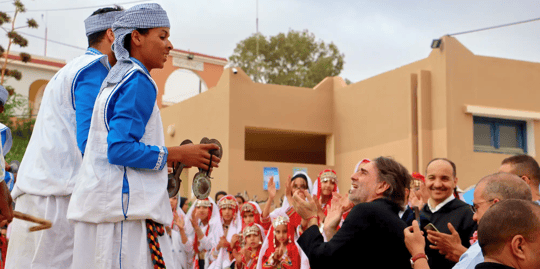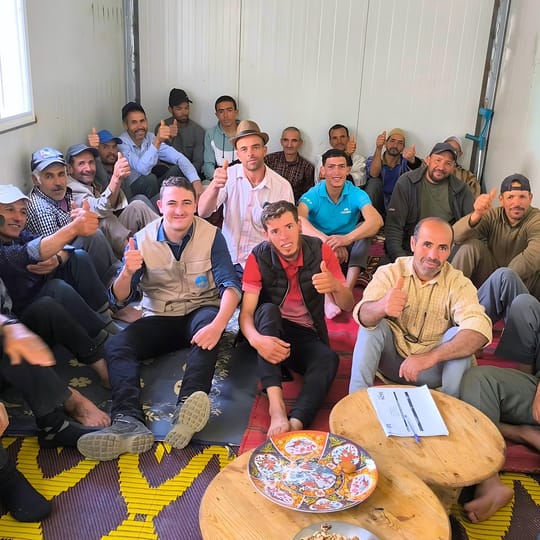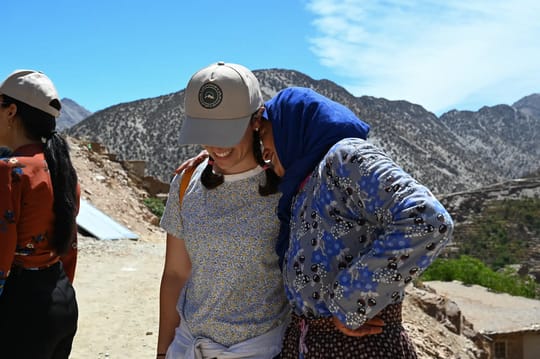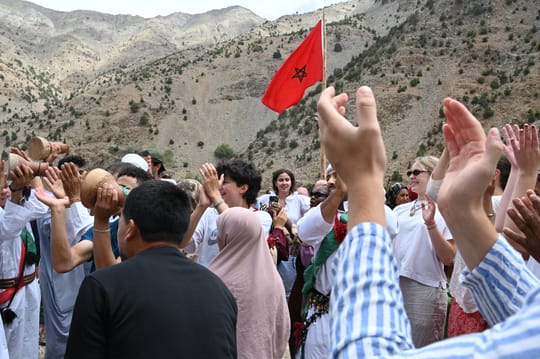Tamghrabit and Sustainable Development: Fusing Essence and Impact in an Existential Journey

In a global context where the pace of change accelerates and the complexities of development intensify, Morocco emerges as a unique human model, manifesting the intertwining of profound identity and a steadfast connection to the land, alongside an ardent aspiration for a sustainable future. This model is embodied in the concept of "Tamghrabit"; not merely a term describing national identity, but an existential pulse that guides the trajectories of sustainable development and forms a comprehensive philosophical and practical framework for my deeply rooted experiences as both a Program Manager at the High Atlas Foundation (HAF) and a facilitator of community mapping workshops and men's empowerment. It is a narrative that interweaves personal experience with the depth of philosophical thought, humanizing the developmental path in its broadest human dimension.
From the Intangible to the Real: Tamghrabit as an Architecture for Development
My journey began on the benches of the Faculty of Law in Fez. This was not merely a repository for static theoretical knowledge but a starting point for grasping the existential radicality of the connection between legal knowledge and the societal fabric. My transition from beneficiary to volunteer in the Legal Clinic program, and then to an active member of the HAF team, was not merely a career progression. It was a living embodiment of a firm philosophy that believes authentic development is rooted in a deep understanding of communities and their heritage. This partnership between academia and civil action, in which I had unwavering faith, is a perfect illustration of the educational philosopher Paulo Freire's profound insight: "Education does not transform the world. Education changes people. People change the world." And that is precisely what happened; I transitioned from the realm of abstract legal texts to the space of lively interaction with real legal issues, contributing to establishing the foundations of legal awareness and combating legal illiteracy—methodical steps towards empowering individuals and communities, according to a vision that transcends narrow utilitarianism to embrace a holistic construction of self and environment.
My diverse experiences across this vast Kingdom – from supervising the Legal Clinic in Marrakech, to being responsible for monitoring and evaluating projects in the Dakhla-Oued Ed-Dahab region, and extending psychosocial support to the victims of the Al Haouz earthquake – propelled me into direct and profound engagement with local populations and their authentic, diverse cultures. These interactions revealed to me the unyielding spirit of "Tamghrabit" and its majestic presence, like an unbreakable thread connecting villages and cities and standing resilient in the face of challenges. In every workshop I facilitated in various Moroccan universities across Agadir, Beni Mellal, Marrakech, Fez, and Oujda, I witnessed how delving into the understanding of this rooted identity is the true key to building civil society capacities and empowering individuals, thereby ensuring the sustainability of impact. This lived experience proved to me that development is not merely a series of programs implemented but an existential process of interaction with oneself and others, fostering a sense of belonging and unleashing creative energies.

“Education does not transform the world. Education changes people. People change the world.”
— Paulo Freire, Educational Philosopher
Heritage and Land: Sustainable Fountains of Existence
The concept of "Tamghrabit," encompassing its rich ethnic and cultural diversity – represented by its Arab-Islamic, Amazigh, and Sahrawi-Hassani tributaries, along with its vital openness to African, Andalusian, Hebrew, and Mediterranean influences – is not just a folkloric cultural concept but an integrated philosophical framework for sustainable development. Heritage, in its philosophical depth, transcends being mere relics of the past; it is the bedrock that shapes our present existence and opens up infinite possibilities for the future. This philosophical perspective resonates with the insights of great philosophers like Martin Heidegger in their profound understanding of the human existential link to historicity and rootedness in place, where the past is not dead but alive in shaping the truth of being.
This existential connection to heritage and land, embodied by "Tamghrabit" in all its dimensions, is the very essence of what sustainable development aims for in its highest meanings. When we promote sustainable agriculture or provide innovative solutions for clean water, we are not just offering technical answers; we are honoring humanity's existential relationship with its land and enhancing the resilience of communities in the face of climatic and economic challenges. This endeavor aligns perfectly with the pivotal principle of sustainable development, which aims to meet the needs of the present generation without compromising the ability of future generations to realize themselves and fulfill their requirements.
The efforts to empower women—a fundamental pillar of human development—, strengthen the capacities of civil society organizations, and train youth and students all constitute crucial investments in human capital which is the anthropological foundation of sustainable development. These investments stem from a firm belief that development is not confined to its economic dimension alone but extends to encompass social, cultural, and environmental spheres. As human development theory suggests, true development aims to expand individuals' choices and latent capabilities, and this is evident in every aspect of our work.

Towards the Future: An Existential Faith in Tamghrabit's Resilience and Development's Impact
I do not deny that moments of doubt and vulnerability sometimes creep into the soul, especially when the manifestations of poverty and fragility appear intractable. Yet, these fleeting moments quickly dissipate in the face of my deep conviction that development is a cumulative process, demanding existential patience, arduous effort, generous giving, and boundless altruism. I firmly believe that what we do today makes a difference tomorrow, and that a long-term development journey requires continuous perseverance and a vision that transcends the short term. While I may not live to see the full realization of my aspirations for my beloved homeland, I am absolutely certain that future generations will continue to build and innovate in ways suited to their time and place. This faith is my existential driving force that compels me to continue.
Tamghrabit is not merely a past to be revisited; it is a living continuity, a mirror reflecting the essence of Morocco: multifaceted in its components, unified in its identity, rooted in its authenticity, and open to the world with a resolute vision. It is this spirit that motivates me to contribute, from the university lecture hall to the farthest reaches of this vast nation, to the development of its unchanging essence: the love for this diverse homeland, built upon this unique identity. As I perceive, drawing inspiration from the thought of the philosopher Hans-Georg Gadamer: "The person who contemplates himself outside the vital bond of heritage corrupts the true meaning of this heritage." It is our existential pride, our perpetual source of inspiration, and living proof that authenticity is the unshakeable foundation for every genuine opening toward a prosperous and sustainable future, bearing within it the seeds of renewed human giving.
